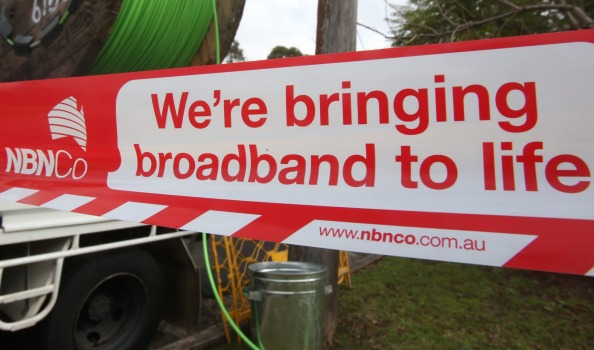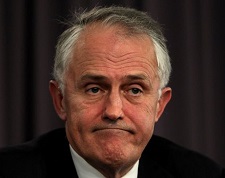
In a waiting room, having nothing better to do than read news items on my phone, this one appeared:
Continue reading The gig economy is not all it is cracked up to be
National Broadband Network

In a waiting room, having nothing better to do than read news items on my phone, this one appeared:
Continue reading The gig economy is not all it is cracked up to be
I wonder whether other states have a similar capacity, but it seems the electricity system in Queensland has a fibre optic network with plenty of spare capacity. They just strung it out on the poles, and presumably use it to run the electricity network.
During the recent election campaign I heard Steve Baxter, the Chief Entrepreneur, say that a decision had been made to open the fibre network to businesses in regional towns, which would give them internet speeds equivalent to those in Brisbane CBD. He rated it as the most important piece of state infrastructure since bitumen roads.
On the weekend there was an article in the Sunday Mail (probably pay-walled) which said the facility was already available to businesses on a commercial basis, and could provide an alternative for residents only reachable via satellite in some towns. Continue reading Queensland to set up it’s own NBN and become startup central

Would that they were.
Paul Budde has urged the government to press the reset button on the NBN, as short-term and longer-term faults and complaints affect up to a third of connected customers and large numbers of premises are being put in the too hard basket for connection.
One man was without a phone or internet for four months, and only got relief after media involvement. Then he got relief by being reconnected to the legacy service he had left, which is against the rules. Continue reading Pressing the reset button on the NBN
 When Malcolm Turnbull was Minister for Communication he was often refreshingly honest about LNP policies he didn’t agree with, leading to an expectation that when he became PM policies would be modified. Now that politics is alive again after the summer torpor, several well-known commentators have taken a look at what the change to Turnbull means. Continue reading Turnbull: old policies immovable?
When Malcolm Turnbull was Minister for Communication he was often refreshingly honest about LNP policies he didn’t agree with, leading to an expectation that when he became PM policies would be modified. Now that politics is alive again after the summer torpor, several well-known commentators have taken a look at what the change to Turnbull means. Continue reading Turnbull: old policies immovable?
Radio National’s Background Briefing is about to take a look at Turnbull’s NBN.
The program will go to air on Sunday, November 1 at 8am, repeated Tuesday, November 3 at 9pm. It will also be repeated on NewsRadio at 1pm on Sunday. Continue reading NBN alert

An open thread where, at your leisure, you can discuss anything you like, well, within reason and the Comments Policy. Include here news and views, plus any notable personal experiences from the week and the weekend.
For climate topics please use the most recent Climate clippings.
The gentleman in the image is Voltaire, who for a time graced the court of Frederick II of Prussia, known as Frederick the Great. King Fred loved to talk about the universe and everything at the end of a day’s work. He also used the salons of Berlin to get feedback in the development of public policy.
Fred would only talk in French; he regarded German as barbaric. Here we’ll use English.
The thread will be a stoush-free zone. The Comments Policy says:
The aim [of this site] is to provide a venue for people to contribute and to engage in a civil and respectful manner.
Here are a few bits and pieces that came to my attention last week.
1. Australia’s internet speeds have slumped to 44th in the world
The State of the Internet Report from cloud service provider Akamai ranks Australia 44th for average connection speed.
One of the reasons why we’re falling down the list is that we’re moving towards utilising a copper based access network. Whereas previously, under the Labor government, we were moving towards an all fibre-based network, which is what most of our competitors are now doing. And we’re also seeing this drop because, as we keep changing direction with the NBN, we’re putting in large delays before the roll-out is actually occurring.
NetFlix which is meant to be coming online towards the end of March may not be able to be accessed everywhere and will be of poorer quality than in other countries. Many of our competitors are looking at gigabit broadband download speeds. Thanks to the Abbott government we’ll be in the Dark Ages.
2. Morgan poll
The Morgan poll ploughs on over the festive season. On LNP leadership:
Former Liberal Party Leader Malcolm Turnbull is preferred as Liberal Leader by 36% of electors (down 2% since September 30-October 2, 2014) but still well ahead of Deputy Leader Julie Bishop (26%, up 10%) and Prime Minister Tony Abbott (14%, down 5%). Bishop is now ahead of Abbott for the first time as preferred Liberal Leader. No other candidate has more than 4% support.
However, L-NP voters just narrowly prefer Prime Minister Tony Abbott (30%, down 11%) as Liberal Party Leader ahead of Deputy Leader Julie Bishop (28%, up 11%) and Malcolm Turnbull (26%, up 2%). Treasurer Joe Hockey has lost significant support and is now at only 4% (down 4%).
Hockey seems to have evaporated after announcing that poor people don’t drive cars. Meanwhile Bishop is surging.
3. MYEFO disappears
Speaking of Joe Hockey, the Mid-Year Economic and Fiscal Outlook, coinciding with the Sydney siege, has disappeared from view. John Quiggin has a neat summary of why it undercuts the LNP policy narrative:
Key elements of that narrative are:
* Debt and deficits are always bad, are now at catastrophic levels and are the product of Labor profligacy
* More labour market reform is needed to prevent a wages explosion resulting in higher unemployment
* The mining sector is the key to Australian prosperity and was unfairly burdened by the carbon and mineral resource rent taxes
Debt and deficits are growing as a result of weaker revenue, exactly as happened under Labor, and in any case do not constitute a serious problem.
As regards wages, not only does MYEFO note that wage growth (low and stable for many years) has been weaker than ever, this is noted as one of the main factors leading to the decline in revenue growth.
The mining industry was never a large employer and is now shedding jobs rapidly.
The good side of this is that the overvaluation of the $A driven by the mining boom is finally fading, with the result that the net impact of the end of the boom is forecast to be quite small. We have much more to fear from a renewed global financial crisis than from a decline in mineral prices.
4. The old guard still controls the grand slam court
Greg Jericho turns his analytical mind to tennis, well male tennis, suggesting that the old guard are still in control and don’t write Federer off – Jimmy Connors played until he was 39 and Andre Agassi until he was 36. Federer is only 33. He didn’t mention Ken “Muscles” Rosewall, who won his last tournament at the age of 43.
I’ve always thought that most grand slams are won by people in the age bracket 24-28. Jericho suggests 27 as the age beyond which winning becomes tough. Novak Djokovic and Andy Murray are 27, Nadal is 28. They are not true contemporaries of Federer.
I have no idea who is going to win, but I think it’s a bridge too far to expect Federer to win seven best-of-five matches in a row.
But Sarina Williams at age 33, you wouldn’t bet against her! Of course she only plays the best of three, but that’s another story!
I do think Djokovic, Nadal and Federer are a cut above the rest, with Andrew Murray also in the mix. They may stay in charge for another year or two.
Donald Rumsfeld spoke about “unknown unknowns”. The Communications Chambers cost-benefit analysis (CBA) report gets rid of such nonsense by ruling it out. As Stilgherrian at Crikey says:
the key problem is the overall assumption that we’ll see a gentle, incremental growth in internet demand — whatever its rate for individual application — based on the kinds of things we’re doing on the internet today.
During a digital revolution, they seem to have missed the revolution part.
So the Multi-Technology Mix (MTM) model for the NBN will be fine, as long as you don’t want to use the internet much. Or as David Havyatt at the AFR says:
Choosing between the MTM and FTTP isn’t just about the outcome of the CBA. It is about choosing whether we want the nation to be technology leaders or technology laggards. It is about choosing whether we want to make do with inefficient government service delivery or drive it hard for efficiency and effectiveness.
The MTM simply rules out applications that could emerge in health and education which depend on a ubiquitous high-speed service, so public benefit is put at 5% of usage in the review. In truth it’s unknown with the fibre to the premises (FTTP) option, which was why a CBA always had limited value.
Stilgherrian says the model completely misses the Internet of Things, that is, the myriad devices such as smart air conditioners and light bulbs, toys and medical sensors. It assumes that such usage will fit into the cracks.
So 15 Mbps is seen as good enough for the vast bulk of users. There is no value assigned to the higher speeds a 100 Mbps would provide.
Hence the review strips away the known unknowns, dealing only with known knowns and very conservatively at that. Gentle, incremental growth in existing internet demand is assumed. It’s a case of dumbing down to the lowest common denominator.
The NBN strategic review found the FTTP cost only $8.6 billion more than MTM, a steal at the price. Yet the CBA review has inexplicably added $4 billion to the cost of FttP. Havyatt says this is problematic if not simply arbitrary and wrong.
In his blog post Havyatt points out that 70% of people connected to the NBN are opting and paying for a 100/40 Mpbs service. They are looking for speed if not volume. That’s what they want. Turnbull’s mob are taking the paternalistic view that it is not what they need.
I’m not sure of the funding arrangements for the NBN. I suspect that it is being funded on budget as an infrastructure program. Labor’s FTTP system was being funded off-budget effectively costing taxpayers nothing, against future privatisation.
All in all as in so many areas the Abbott government is dragging us back decades and compromising our future as a sophisticated economy. Think, for example, the renewable power industry and their passion for coal. Labor’s positive legacy is being destroyed with vigour and enthusiasm.
See also Deja vue all over again: the new NBN.
Laura Tingle reckons the arrival of Turnbull’s NBN Strategic Review is deja vu all over again:
The raw politics of this is that, no matter how much the Coalition can complain that it has been left to clean up a Labor mess, a mickey mouse broadband network is now a mess that it owns and has insisted it will put its own stamp on. The cost of this decision is that we have to go back to the start to redesign NBN Co itself; the technological platform of the broadband system, the competition regime and a myriad of contracts.
This will take time.
There is going to be a cost benefit analysis and a review of NBN regulation. There will be changes to procurement strategy, renegotiation of deals with Telstra and Optus, of the special access undertaking lodged with the ACCC, reviews of NBN Co’s fixed wireless and satellite programs, a corporate plan, possible legislative and regulatory changes to access multi-dwelling units and utility infrastructure.
Tony Boyd spells out some of the detail. Significantly, the ‘multi-technology mix’ (MTM) is going to mean that
the entire NBN network technology management system will have to be redesigned. The IT systems will have to be changed and operational processes will have to be modified to support copper, HFC and FTTN.